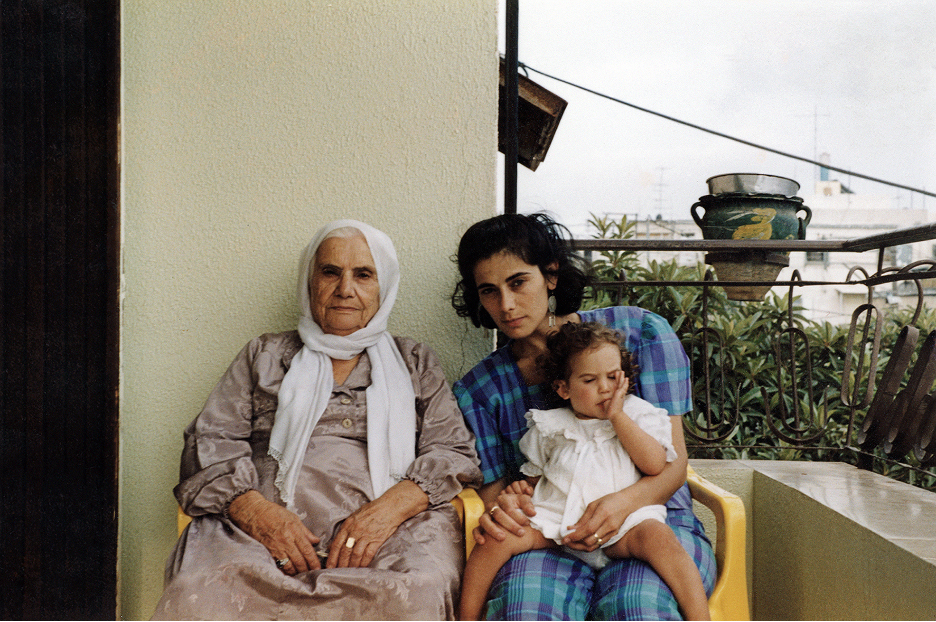[This interview was conducted on 17 February 2024.]
Bye Bye Tiberias was the Palestinian entry for the 2024 Academy Awards. This interview was conducted before the screening of Bye Bye Tiberias at the fourth Middle East Film Festival at Denison University.
Isis Nusair (IS): We wanted to start by asking about the connection between your first film, Their Algeria, and your second film, Bye Bye Tiberias. Themes of displacement, memory, and identity come up in both films.
Lina Soualem (LS): I would not have been able to make Bye Bye Tiberias without making Their Algeria. My second film is a continuation of the first. Their Algeria explored the story of exile of my paternal grandfather and grandmother who immigrated from Algeria to France in the 1950s. They separated when they were eighty years old. I wanted to explore their story of exile and displacement, and how that intimate separation was a result of a series of separations. They went through the first separation when they were uprooted from their land. Since my maternal side of the family is Palestinian, I wanted to keep exploring these themes and tell the story of these women.
IS: This also relates to your identity as the daughter of Algerian and Palestinian parents, and the borders you are trying to cross in the process.
LS: I grew up with a strong presence of women in my life especially on my mother’s side. My mother has seven sisters and two brothers. I was surrounded by these women as a child when we visited Deir Hanna, my mother’s village in the Galilee. Even though my mother left her village when she was in her twenties to pursue her dream of becoming an actress in Europe, she carried with her their stories, strength, and values. I always asked myself, what did she want to pass on to me?
My mother had to make bold choices. Yet, she remained very close to her family and culture. It is this complexity that was important for me to explore in the film. We are used to seeing women in cinema, especially Arab women, represented often in a stigmatized or binary way. It is either a representation of the traditional women that is very conservative and abiding by men’s rules, or the liberal woman who cuts ties with her family, goes to the West, and adopts Western values. The reality is more complex. These women remain attached to family and tradition yet have their own aspirations.
IN: Can you elaborate more on these generational connections, that between your mother, grandmother, and great grandmother, and their connection to Tiberias? There is also the diasporic and exilic element since you live in France.
LS: Because the film is a story of transmission from mother to daughter, from women to women, it also echoes the collective memory of the Palestinian people. The personal story is very important as Palestinians are often referred to as numbers or as a homogenous group without allowing their individuality to resurface. This can lead to dehumanization. As I was writing these personal stories and collecting the dispersed memories of my family, reconnecting one generation to the other, I also wanted to reconnect them to the collective memory. This memory is often silenced because the story of the Palestinian Nakba (catastrophe) is not recognized. Portraying historical archives allows the individual story to to be part of the collective story. The archival footage shows a diverse society with people from different classes and urban and rural areas.
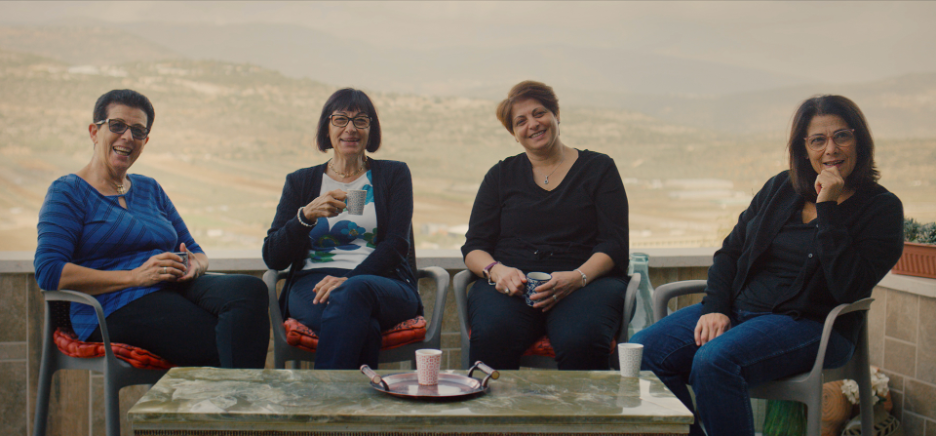
Bye Bye Tiberias, Sisters/Aunts, Deir Hanna
Michael Morris (MM): I was really struck by how you worked with your family, and how willing they were to work with you to relive some difficult memories. Since I am also a filmmaker, and made films with my family, I know how hard that can be, particularly when you are pushing them to uncomfortable places. They may or may not actually want to work with you anymore. The way you worked with them was really touching. I wonder what that experience was like, particularly when you do things like reenact difficult memories for the camera.
LS: I do not think I would have made the film if I had to face a confrontational situation. I would not have made either my first film, Their Algeria, nor this one. I knew that I could film my family, and that I was not going to be pushed away. That is why I did it, especially that the personal stories could be very heavy, dealing with pain and trauma. I would not have wanted to talk about this trauma while creating other traumas.
My father filmed both my paternal and maternal families in the 1990s. They got used to the presence of the camera. He was recording for personal home footage. The fact that my mother and father are actors also helped. My family members always tell me, “the apple doesn't fall far from the tree.” They were excited to participate and felt blessed to be able to tell their stories. The film is also an homage to my grandmother and great grandmother. It allows them to exist beyond their disappearance as Palestinian women who were never granted the opportunity to tell their stories.
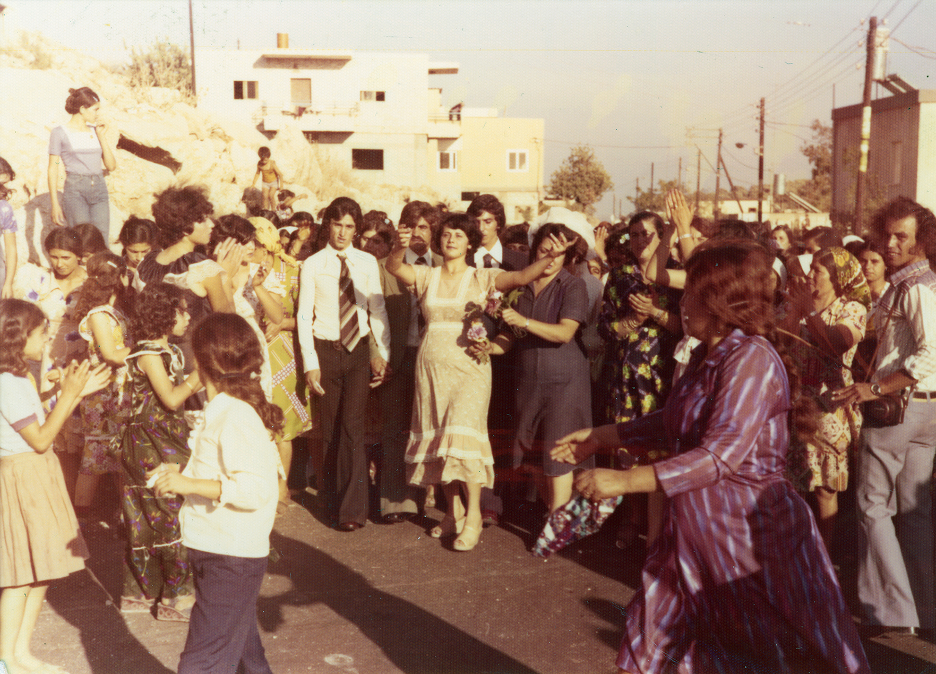
Bye Bye Tiberias, wedding, Deir Hanna
MM: I wonder what it was like to bring some of your mother's acting past back into the film.
LS: It was more difficult to film my mother than my aunts, which is contradictory because she is the only actress in her family. She is used to lending her emotions to fictional characters and expressing them through other stories. She had never participated in a documentary film before, especially a documentary made by her daughter. It was hard for her to let go of being too conscious of the camera. It was also intimidating for me since my mother has worked with great filmmakers. It is not like I had a script and knew what I wanted. I was searching while filming. It took us a while to find our balance. It was hard to present myself to my mother not only as a daughter, but as a woman and filmmaker. One is not used to addressing their parents as equals. We needed to find a space to share beyond our close mother-daughter relationship while remaining authentic. She would say, “don't open the gate to the sorrows of the past,” which is something that her own mother and grandmother used to tell her when she was trying to ask questions about their lives. Like me, she tried to understand their stories and I wanted to reactivate that transmission.
I asked my mother to reenact some of her meaningful life choices; moments that were important but also painful. I knew that what she loved the most was acting. I did not want her to suffer as we were filming. It was not a reenactment in the sense of creating a new set. It was not fiction; everything still came from reality. I was asking her in front of the camera to put herself in the shoes of her younger self to try to convey the emotions she felt at the time. By asking one of her sisters to be present, they were able to go back in time and recreate genuine conversations and feelings. It was nice to see how my aunts enjoyed being part of these scenes.
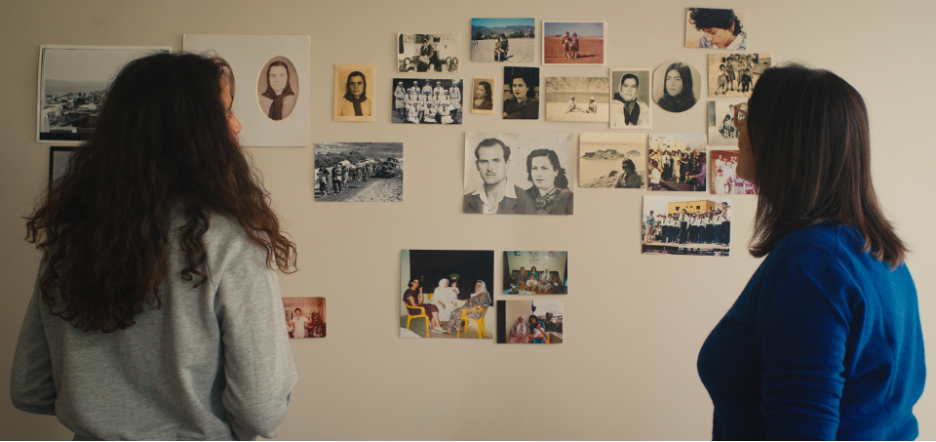
Bye Bye Tiberias, family pictures, Paris
MM: I wanted to ask about the family and archival footage. You mentioned that your dad was the videographer for a lot of that footage. And then, of course, your mother had a relationship with photography. You also have this great archival footage that I assume came from other archives or collections. It is nice to see that kind of overlap between things that are intimate from the past, shot for the purpose of building a family archive of memories and connect them with archival footage that documents the social reality of Palestinian history. I love the way you work with photographs rather than just displaying them. You create this sort of activity with your family. You display the pictures and bring out the memories associated with them. I wonder what your approach was there?
LS: I always knew that the film was going to be constructed around different images. I wanted to have contemporary images as well as historic archival material. I did not know at first why I was so attached to having these different types of images. It was not an aesthetic choice simply because I liked them. Our story and memory are dispersed and scattered. It is hard to tell a story when you do not have a linear official story. These different sources for images become a proof of that existence. Each archive becomes a piece of the memory that is not recognized. It is always an incomplete memory.
It was a way to create through the film an imaginary territory in which we can coexist, all the women in the family, even though we did not live in the same place, and some of the places we used to belong to are not there anymore. It is like a utopia, as if exile and displacement did not take place. These different images bring up a question I always had and think a lot of children of immigrants around the world have. What if I was born there? What if my family was not displaced? What would our story be like?
We know how much the collective story impacts the most intimate of relationships. It impacts the way you raise your children and the values you pass on to them. It is a question that has no answer, really. My mother might have left anyway, with or without displacement. A lot of people decide to leave their country even without these kinds of situations. The artistic form is linked with the reality of the story, and the film is a process of trying to reconstitute that puzzle. It is not a film where I was trying to reveal family secrets. It is about rewriting our story with our own words and allowing it to exist.
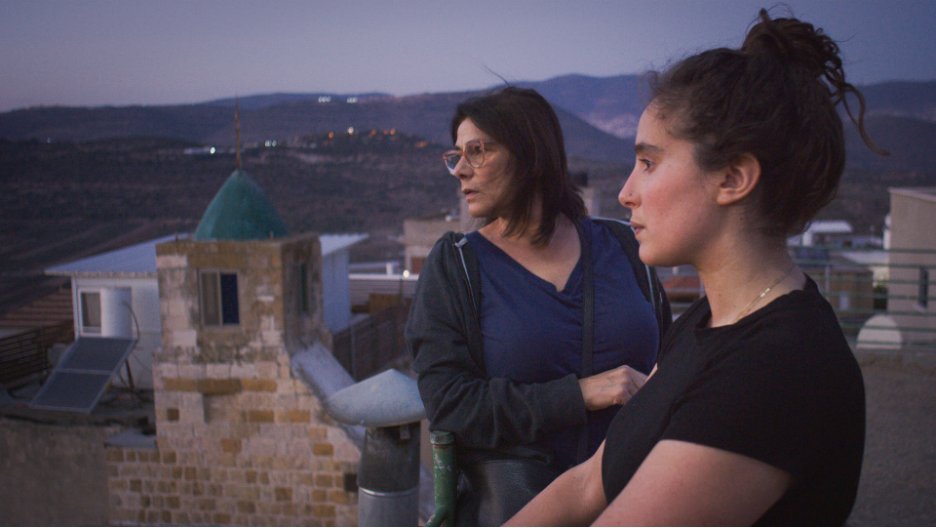
Bye Bye Tiberias, Mother (Hiam Abbass) and daughter (Lina Soualem), Deir Hanna
MM: One of the ways I saw linkage and connection to family in the film was through language, particularly the Arabic language, and how you talk about your relationship to language and switch so fluidly back and forth between French and Arabic. There are these great moments where your mother is reading her poems and singing songs that she had written in Arabic. I guess I identify with that a lot because my family also comes from the Mediterranean area, but I do not have the language to connect to them in that way. I wonder how you approach language and how having the language connects you to your family's story.
LS: This is something I thought about while making the film. In what language will I speak, and in what language will I ask my mother to read? Do I tell her that we speak only Arabic or French? I know that I cannot control the process and needed it to be natural and fluid to represent our relationship and what it means to live in exile. When you raise a child in a foreign country, there is distance and rupture. This is a product of exile, whether forced or chosen, and it is part of the reality of our relationship. My mother transmitted Arabic to me since she did not speak French when I was younger. I am not fluent in reading and writing Arabic since I did not learn it in school. There is a whole part of the imaginary of that language that I do not have access to and, therefore, cannot grasp.
At the same time, my mother learned French through my sister and I. She speaks French yet does not master the language. I realized before making the film that we have two languages. We do not have half a language. We have a new language that we created together by naturally mixing Arabic and French. I accepted the fact that I could only write the text in French because it was the language that I was the most at ease with. I could have written the text in French then asked someone to translate it but did not want to do that. When I ask questions of my mother, she naturally switches to Arabic when tackling emotional issues. I really wanted to show the reality of what it means to transmit in exile. This in the end is one of the topics of the film.
